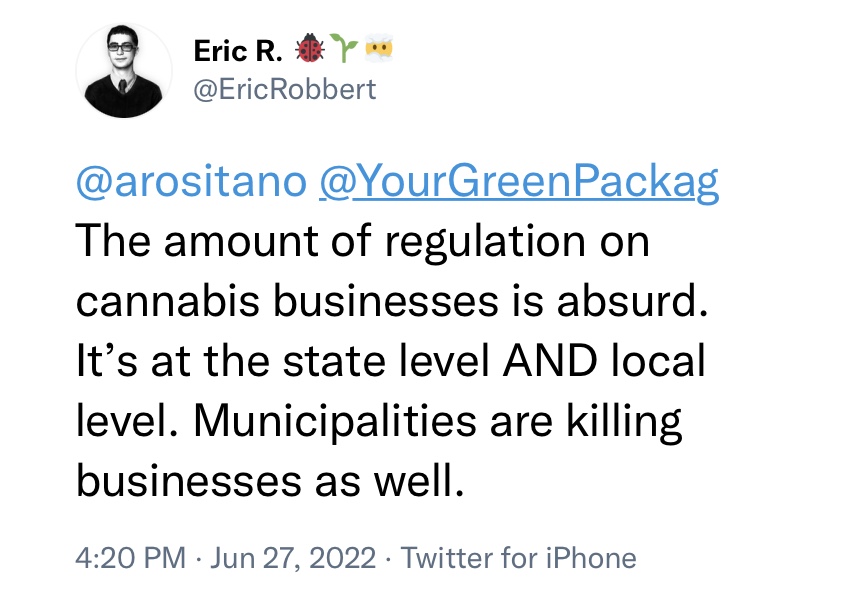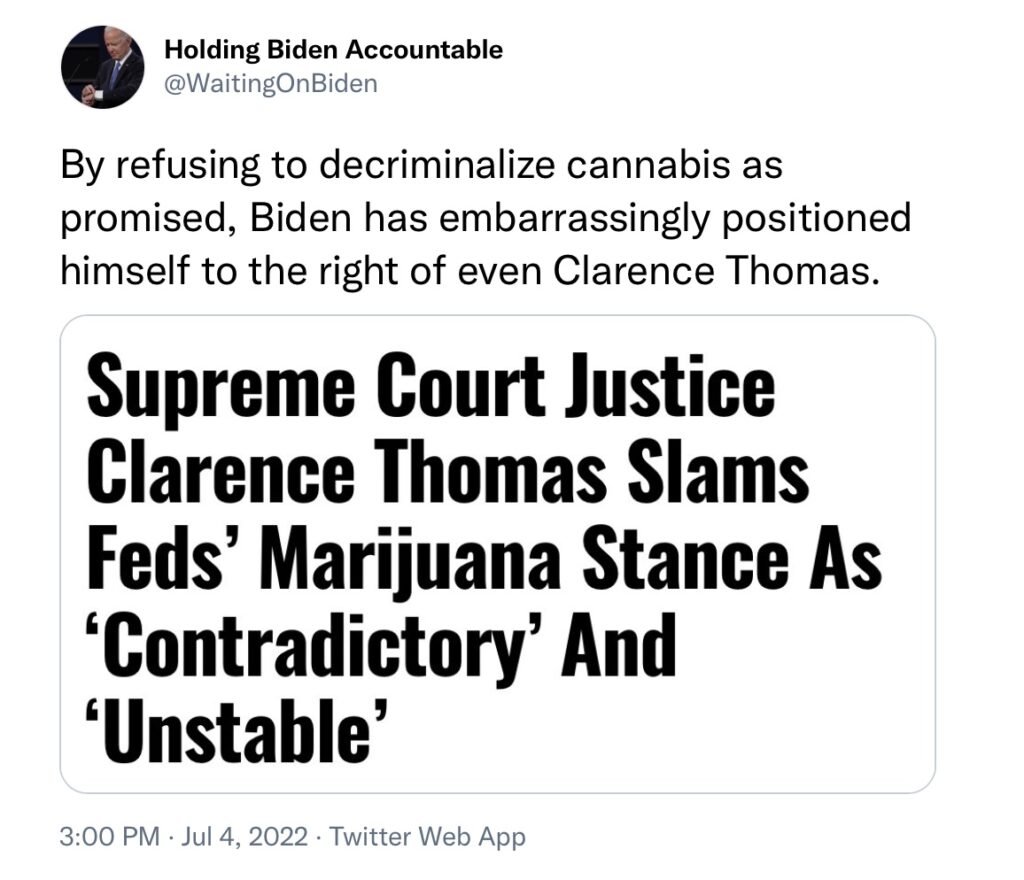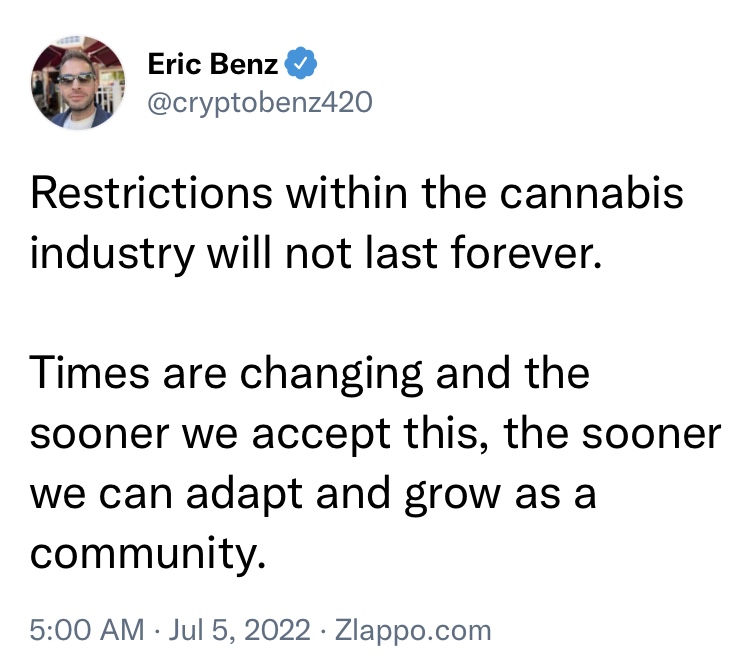05 July 2022 | Cannabis
Municipalities, President Biden, and the future industry.
By Kaitlin Domangue
How local governments impact cannabis

I talk a lot about federal regulations (lookin’ at you, last Sunday’s newsletter). I talk a lot about state regulations, too.
I don’t, however, talk much about municipality regulations.
It’s up to each U.S. state to legalize cannabis or not. But referendums also exist in most states that allow individual municipalities to opt-in or out of cannabis operations within their borders.
Some local jurisdictions prohibit cannabis operations completely.
305 out of 539 cities and counties (57%) in California don’t allow any cannabis businesses – which is insane to think about, considering California is the world’s largest cannabis market.
And it doesn’t stop there. In New Jersey, for example, municipalities can decide:
- How many cannabis businesses are allowed in their jurisdiction
- The hours of operation and location of each cannabis business
- Levy local taxes up to 2%
- Issue civil penalties for violations within their jurisdiction
Cannabis regulation goes so much deeper than we realize. We have to appease local, state, and federal regulators. It’s an impossible ask under federally illegal conditions.
Most states do not allow individual municipalities to ban the transportation of cannabis through their jurisdictions, just the production, manufacturing, and sale of cannabis.
Direct-to-consumer deliveries from businesses in in other towns are typically also allowed, however, 25 of California’s local governments sued the state in 2019 to try and overturn this state law.
Municipalities outright reject cannabis businesses for a variety of reasons, like:
- Concerns about how the cannabis program will be regulated
- The impact of cannabis and cannabis legalization on public safety
- The chances of profitability for cannabis businesses in that jurisdiction
- Zoning issues
Cities and counties that skip out on cannabis, though, are leaving money on the table.
What I’m Thinking 🧠
We don’t need to worry about the municipalities that don’t want our industry.
We definitely need to worry about the municipalities who want to impose asinine restrictions on our business within their borders.
Unlike the federal government, apparently, local governments do have a level of oversight from the state. There are written state laws that local municipalities must abide by, preventing too much of a power trip.
President Biden’s lack of cannabis action draws criticism

I wouldn’t go as far as saying President Biden has positioned himself to the right of Justice Clarence Thomas by not decriminalizing cannabis.
But, it’s overwhelmingly apparent that the federal government’s stance on cannabis is confusing and hypocritical for everyone, including ultra-conservative Justice Thomas.
I say “the federal government’s stance”, but as this Twitter account is claiming to do, we should also hold President Biden accountable specifically for this issue.
After all, he’s the one who championed federal cannabis reform on the 2020 campaign trail, alongside Vice President Kamala Harris.
“Nobody should be in jail for marijuana,” then-Presidential candidate Joe Biden said at a New Hampshire gathering in 2019.
Respectfully, releasing people who are in jail for cannabis is the least President Biden can do. That should be a given.
The White House hasn’t come out and said whether or not President Biden supports federal cannabis legalization, despite cannabis stocks soaring after his election in November 2020.
Former Press Secretary Jen Psaki said President Biden agrees that “our current marijuana laws are not working” after the MORE Act passed the House in April.
At one point, however, Psaki said Biden’s stance on opposing broader reform beyond decriminalization “has not changed”, sending a confusing message.
Over half the country has legalized cannabis on some level, and the federal government is collecting taxes on our industry: yet they haven’t even decriminalized it or nationally expunged any records.
The federal government stands to lose $5 billion in cannabis tax revenue when it’s federally legal, due to Section 280E becoming obsolete. It makes me, and others, question how much of their decisions are made with dollar signs in mind.
What I’m Thinking 🧠
I’ve touched on this topic before, and my sentiment is the same as it was then: I’ve given up on cannabis legalization. For now.
Here’s a snippet of what I wrote in a previous newsletter:
“While I can’t say I’ve given up on cannabis legalization, I truly have given it up for the foreseeable future and those have been my feelings for several months.
I’ve honestly given up on nearly every piece of cannabis legislation that isn’t led by citizens. 🤷♀️ We’ve seen the MORE Act, SAFE Banking, and others circulate Congress too many times without resolve.
The current administration [Biden/Harris] has done next to nothing since taking office to indicate that cannabis legislation, of any kind, is a priority for them.
However – I am not giving up completely. We can’t. I am just giving up on predicting when it might happen or that it will be soon.”
It’s a day to reflect on when Justice Clarence Thomas is calling the federal government’s stance on cannabis “hypocritical and unstable” and Biden remains silent over the issue.
Building for the future cannabis space

This is such an interesting perspective.
There’s a huge focus on what we can’t do right now. I’m definitely part of the crowd who focuses heavily on the restrictions and regulations.
But like Eric says in this tweet, the restrictions won’t last forever. They are actually being dissolved one by one before our eyes.
Washington D.C. just introduced self-certification for medical cannabis patients, eliminating the need for a physician completely. New York City allows public consumption where tobacco is allowed.
One day, we will wake up and find ourselves in a less restricted marketplace.
When federal legalization arrives, we will have federal oversight. The competition will increase. Interstate commerce could be introduced. The best cultivator in the state could be booted out by the best cultivator in the country.
What I’m Thinking 🧠
The time is now for cannabis businesses to prepare. Times are changing. Restrictions won’t be here forever.
In 10 years, this industry could look totally different. And the businesses who are agile and keeping up with the times will be the ones standing.